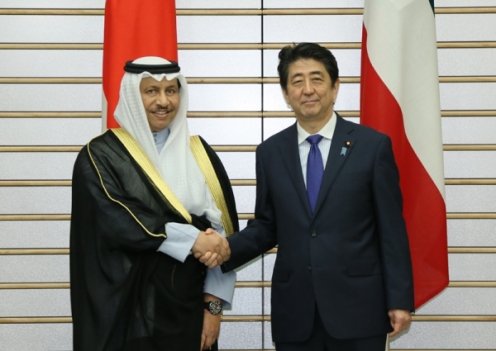[Cabinet Secretariat] [Tuesday, May 10, 2016]
Comment by Prime Minister Shinzo Abe on President Obama’s visit to Hiroshima
It has been decided that President Obama and I will visit Hiroshima, an atomic bombing site, on the 27th of this month, following the G7 Ise-Shima Summit. I sincerely welcome President Obama’s visit to Hiroshima. Many people in the city tragically lost their lives due to the dropping of the atomic bomb 70 years ago. This visit will serve as an opportunity for both Japan and the United States to pay tribute to all of the victims. As the only country to have ever suffered atomic bombings, Japan has consistently advocated the elimination of nuclear weapons, vowing that such a tragic experience should never be repeated anywhere in the world. I am convinced that President Obama visiting Hiroshima, witnessing the realities of atomic bombings, and communicating his thoughts and views to the world will provide significant momentum for the creation of a world without nuclear weapons. I am committed to working with President Obama to realize such a world.
Many lives were lost due to the dropping of the atomic bombs 70 years ago. It is also true that many people are still suffering even now. I believe it is their strong wish that such a tragedy never be repeated. President Obama has always stated that as the only country to have utilized nuclear weapons, the United States has a responsibility to take actions toward creating a world without nuclear weapons. Through this visit, a message will be sent out from the atomic bombing site to the world about the President’s determination for a world without nuclear weapons. I believe this has significance for our generation, our children’s and grandchildren’s generations, and all future generations.
President Obama will be visiting the atomic bombing site. I imagine that this was a major decision for the U.S. President. The leader of the only country to have utilized nuclear weapons in the world and I, the Prime Minister of the only country to have ever suffered atomic bombings, will together extend condolences to the victims. I am convinced that this is in line with the wishes of the victims of the atomic bombings and the people who are still suffering even now.
[Ministry of Foreign Affairs of Japan] [Saturday, May 7, 2016]
Japan-Russia Summit Meeting
On Friday, May 6, for approximately three hours and 10 minutes, Mr. Shinzo Abe, Prime Minister of Japan, held the Japan-Russia Summit Meeting with Mr. Vladimir Vladimirovich Putin, President of the Russian Federation, during his unofficial visit to Sochi, Russia. Commencing at 3:50 p.m., the two leaders conducted a summit meeting for approximately two hours (including a 35-minute session between the two leaders just with interpreters) and then participated in a working dinner for about one hour and 10 minutes.
1. Issue of concluding a peace treaty
(1) The two leaders conducted an in-depth exchange of opinions on the Northern Territories issue. As a result, they shared the view that the two countries should actively proceed with negotiations toward the formulation of solutions acceptable to both sides through a new approach that is not stuck in a traditional way of thinking in order to overcome the current negotiation stalemate and make a breakthrough. They agreed to negotiate from a future-oriented standpoint, taking into account not only the bilateral perspective between Japan and Russia, but also a global perspective, and to implement the next round of peace treaty negotiations based on this approach during June in Tokyo.
(2) In this regard, Prime Minister Abe noted that in order to maintain a calm negotiating climate both Japan and Russia should take into consideration national sentiment on both sides and avoiding actions and comments that hurt the other side’s national sentiment.
2. Japan-Russia relations (political dialogue and visits by officials)
(1) The two leaders agreed to actively engage in high-level political dialogue and visits, and to continue leader-level dialogue, with utilizing opportunities at various international conferences. In reaction to President Putin’s invitation to the Eastern Economic Forum being held in Vladivostok in September, Prime Minister Abe accepted it, and the two leaders agreed to hold another summit meeting at that time.
(2) The two leaders confirmed their intention to proceed with preparations on President Putin’s visit to Japan and agreed to look for the most suitable timing during the process of preparing for a meaningful visit.
(3) Besides these meetings, the two leaders also confirmed high-level visits to Japan by Mr. Yury Trutnev, Deputy Prime Minister and Presidential Plenipotentiary Envoy to the Far Eastern Federal District of the Russian Federation, in May, by Mr. Sergey E. Naryshkin, Chair of the State Duma of the Russian Federation, in June, and Ms. Valentina I. Matvienko, Chair of the Council of Federation of the Russian Federation in the second half of 2016.
3. Bilateral relations for the economy, security, and cultural and people-to-people interactions
The two leaders praised advances in cooperation between Japan and Russia in relation to the economy, security, cultural and people-to-people interactions, and other areas. They agreed to promote this type of bilateral cooperation toward President Putin’s visit to Japan.
(1) Economy
(ⅰ) President Putin expressed interest in cooperation in a broad range of areas including economy. Prime Minister Abe introduced Japan’s work for promoting Japan-Russia economic exchange and presented a cooperation plan with eight points (listed below). President Putin highly praised and supported these efforts.
(Note) (1) Extending healthy life expectancies, (2) developing comfortable and clean cities easy to reside and live in, (3) fundamentally expansion medium-sized and small companies exchange and cooperation, (4) energy, (5) promoting industrial diversification and enhancing productivity in Russia, (6) developing industries and export bases in the Far East, (7) cooperation on cutting-edge technologies, and (8) fundamentally expansion of people-to-people interaction.
(ⅱ) The two leaders confirmed recent progress on cooperation projects in the areas of manufacturing, agriculture, and energy. They agreed to promote mutually beneficial cooperation while utilizing meetings such as the Japan-Russia Intergovernmental Committee on Trade and Economic Issues, the Japan-Russian Advisory Council on Modernization of the Russian Economy.
(ⅲ) Prime Minister Abe asked for Russian cooperation to ensure that Japanese fishing boats have operation opportunities by realizing alternatives of salmon and trout drift-net fishing. President Putin responded that Russia intends to closely cooperate with Japan in its consideration of the alternatives and to promote cooperation in the fishery area.
(2) Security
From the standpoint of fostering trust and securing transparency, the two leaders agreed to implement Japan-Russia security discussions and terrorism countermeasure discussions in the near future and to continue interactions between defense authorities, coast guard agencies, and border patrol authorities.
(3) Cultural and People Interactions
The two leaders agreed to increase cultural and people-people interactions. Related to people-to-people visits, Prime Minister Abe explained that Russia is a priority in Japan’s strategic review of easing visas.
4. International Affairs
The two leaders exchanged frank views regarding international affairs, including Ukraine, North Korea, Syria, Central Asia, and Afghanistan. Prime Minister Abe communicated Japan’s strong expectations for a constructive role by Russia, an important player in the international community, in dealing with a variety of global problems.
(1) Ukraine
Prime Minister Abe expressed strong hope for full implementation of the Minsk Agreements by all sides and improved conditions and urged Russia to use its influence over the armed groups and contribute to improve the situation. Prime Minister Abe also explained that he encouraged Mr. Petro Poroshenko, President of Ukraine, to fully implement the Minsk Agreements when he visited Japan last month.
(2) North Korea
Prime Minister Abe noted that North Korea started a Congress of the Workers’ Party of Korea on May 6 and commented that Japan takes the continuation of provocative behavior, such as launching ballistic missiles, very seriously, that it is essential for countries to fully implement UN Security Council resolutions, and that it is important for the Security Council to send a clear and quick unified message in response to violations of the resolutions with the aim of strengthening pressure toward a comprehensive solution of the abduction, nuclear , and missile issues. President Putin stated that Japan and Russia agree in their positions toward North Korea and that North Korea’s possession of nuclear weapons and risky behavior are unacceptable. The two leaders agreed that Japan and Russia will continue to work together to dissuade North Korea from further provocative actions.
(3) Syria Situation
Prime Minister Abe welcome the cooperation between the United States and Russia on the “cessation of hostile actions,” expressed hope for achievement of a breakthrough in Syria’s political process through an even more constructive role by Russia, and called on Russia to exercise influence in regard to the air bombing which is likely to have been conducted by the Assad administration and damaged a hospital and killed civilians.
(4) Central Asia and Afghanistan
Prime Minister Abe emphasized that Japan is actively contributing to the enhancement of connectivity in Central Asia through the building of a logistics network and the realization of the goal of interrupting terrorism and drug trafficking and expressed interest in cooperation between Japan and Russia in this region as well. He also explained that Japan is a major donor country to Afghanistan and that it is engaged in various types of cooperation for anti-drug measures and has been expanding cooperation with Russia in this area to Central Asia from this year. President Putin highly praised these collaborative efforts.
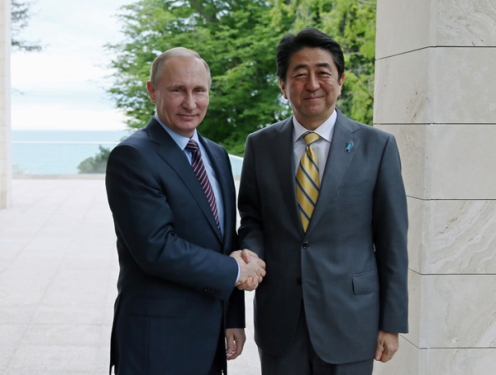
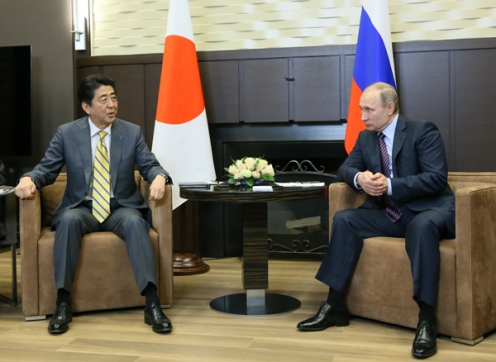
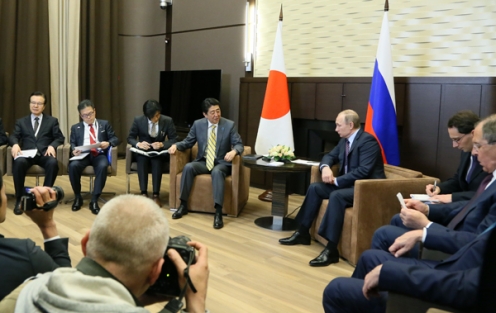
[Ministry of Foreign Affairs of Japan] [Wednesday, May 4, 2016]
Japan-EU Leaders Meeting
On May 3, commencing at 5:45 p.m. (local time) for approximately 45 minutes, Mr. Shinzo Abe, Prime Minister of Japan, held a summit meeting with H.E. Mr. Donald Tusk, President of the European Council, and H.E. Mr. Jean-Claude Juncker, President of the European Commission, during his visit to Brussels and subsequently participated in a working dinner meeting commencing at 6:30 p.m. for approximately 75 minutes. The overview of the meetings is as follows.
1. At the outset, Prime Minister Abe received welcomes from President Tusk and President Juncker. Prime Minister Abe then expressed his heartfelt condolences to the victims and their families of the terror incidents that occurred in Brussels in March and thanked the EU for the words of solidarity and condolences at the time of last month’s earthquake in Kumamoto. Prime Minister Abe also expressed his desire to work closely with President Tusk and President Juncker for the success of the G7 Ise-Shima Summit and to discuss further strengthening of relations between Japan and the EU.
2.
(1) Regarding Japan-EU relations, the leaders shared the view to instruct their respective negotiators to accelerate the ongoing negotiations between Japan and the EU as strategic partners to reach agreement in principle as soon as possible during this year on the Economic Partnership Agreement and achieve an early conclusion of the Strategic Partnership Agreement.
(2) Additionally, Prime Minister Abe welcomed the start of official negotiations on a Japan-EU Air Safety Agreement, praised the steady progress in the easing of EU import restrictions on products from Fukushima Prefecture and other Japanese food items and goods, but also expressed his hope for further actions to eliminate the restrictions, and noted the importance of promoting smooth cross-border transfers of personal information and Japan’s interest in accelerating Japan-EU dialogue in this area.
(3) The leaders welcomed advances in security-related cooperation, such as collaboration between Common Security and Defense Policy mission activities and Japan’s ODA and joint exercises being conducted as anti-piracy measures in the Gulf of Aden and agreed to further strengthen cooperation in this area.
3. Regarding the Ise-Shima Summit, Prime Minister Abe commented that Japan hopes to discuss various global issues in a manner suited to the G7, which shares common values, and to show G7 unity and to send a strong message on the priority agenda such as the global economy as well as responses to terrorism and refugee issues. Prime Minister Abe also stated that an even stronger message on acceleration of structural reforms and potential flexible fiscal policies in order to drive sustainable and robust results for the global economy should be presented at the G7 Ise-Shima Summit. In response, the EU leaders spoke favorably about the G7’s agenda covering priority issues for the EU side and consented to the importance of the role of fiscal policies.
4. The leaders also conducted frank opinion exchanges on a wide range of international topics, including situations in the Middle East, Asia, and Ukraine.
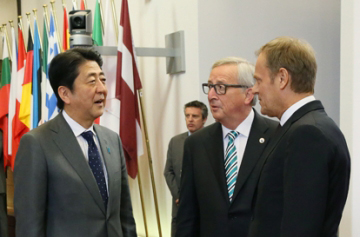
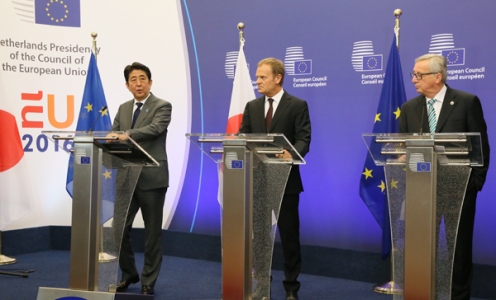
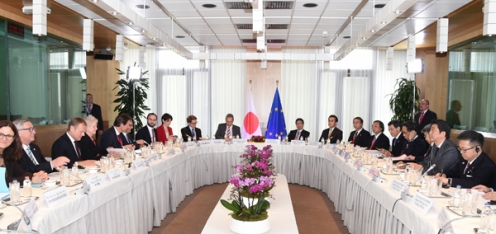
[Ministry of Foreign Affairs of Japan] [Friday, May 13, 2016]
Joint Statement between Japan and the State of Kuwait on Promoting and Expanding Cooperation under the Comprehensive Partnership
H.H. Sheikh Jaber Al-Mubarak Al-Hamad Al-Sabah, Prime Minister of the State of Kuwait paid an official working visit to Japan accompanied by a high-level delegation from May 11-13, 2016, upon the invitation of Mr. Shinzo Abe, Prime Minister of Japan.
During the visit, Sheikh Jaber Al-Mubarak Al-Hamad Al-Sabah was received in an Imperial audience by His Majesty the Emperor of Japan.
Sheikh Jaber Al-Mubarak Al-Hamad Al-Sabah met with Prime Minister Abe, and expressed his deep appreciation to the Government of Japan for the warm welcome extended to him and his delegation, and extended a formal invitation to Prime Minister Abe to visit the State of Kuwait at a time of mutual convenience Prime Minister Abe accepted the invitation.
Formal discussions were held between Japan and the State of Kuwait, during which Prime Minister Abe chaired the Japanese side, and Sheikh Jaber Al-Mubarak Al-Hamad Al-Sabah chaired the Kuwaiti side.
Both sides expressed satisfaction with the bilateral relations between Japan and the State of Kuwait, appreciating the significance of the state visit of H.H Sheikh Sabah Al-Ahmad Al-Jaber Al-Sabah, Amir of the State of Kuwait, to Japan in March 2012, and Prime Minister Shinzo Abe's visit to the State of Kuwait in August 2013.
Both sides confirmed their willingness to enhance the friendly, cooperative and mutually beneficial ''Comprehensive Partnership'' between the two countries through progressive implementation in a broader range of fields such as politics, economy and culture, supported by the mutual exchange of visits by high-ranking officials, as well as various people-to-people exchanges at both public and private levels. Specifically in the field of politics, both sides confirmed their intention for deepening mutual understanding of their respective foreign policies on a wide range of global and regional issues.
Both sides reiterated their intention to further promote cooperation under the ''Comprehensive Partnership'' as follows:
1.Bilateral Relations
Expressing their satisfaction with the outcome of the 1st meeting of the Policy Consultation held in Tokyo in April 2014 and the 1st meeting of the Political and Security Dialogue held in Tokyo in March 2016, both sides shared their intention to continue promoting these frameworks for constructive dialogue.
Emphasizing the importance of the upcoming 2nd Meeting of the Joint Committee between the Government of Japan and the Government of the State of Kuwait, scheduled to be held in Kuwait, both sides reiterated their willingness to hold this meeting as soon as possible, and their commitment to utilizing the committee as a framework for the exchange of views on bilateral relations in a wide range of areas.
On behalf of the people of Japan, Prime Minister Abe reiterated Japan's sincere gratitude for Kuwait's generous support in response to the Great East Japan Earthquake in March 2011.
Kuwaiti Prime Minister expressed the deep condolences on behalf of the government and the people of the State of Kuwait regarding the victims of the 2016 Kumamoto earthquake that has happened in Japan recently, wishing compassion for the victims and healing to the injured.
Prime Minister Abe welcomed Kuwait's decision to lift the restrictions placed on the import of Japanese food since the Great East Japan Earthquake. Both sides expressed their hope that this would give a strong boost to Japanese food imports to the State of Kuwait.
Both sides reaffirmed the importance of the stability of the global energy market. Prime Minister Abe expressed his appreciation for Kuwait's role as a major oil producing and exporting country. Prime Minister Sheikh Jaber renewed Kuwait's commitment to secure the stable supply of oil to Japan, for which Prime Minister Abe expressed his country's gratitude.
Given the significance of further strengthening the economic relationship between the two countries, both sides shared the views that they would accelerate coordination for implementation of cost-sharing technical cooperation.
Both sides shared their determination to further strengthen the economic relationship between Japan and Kuwait. In this regard, Prime Minister Abe welcomed Kuwait's decision to abolish its offset program, expecting that the decision would contribute to the development and expansion of Japanese businesses in Kuwait.
Prime Minister Sheikh Jaber, for his part, expressed his resolve to further develop Kuwait's business environment, highlighting the importance of infrastructure projects such as Independent Water and Power Producer (IWPP), wastewater treatment, refinery construction, metro project and integrated solar combined cycle. In this context, both sides acknowledged the essential role played by the annual Japan-Kuwait Businessmen Committee and its commitment to encouraging bilateral commercial relations since 1995.
Both sides welcomed the signing of the Memorandum of Cooperation in the field of Electricity and Water in May 2015, which is the basis for the 1st Policy Dialogue on Electricity and Water Sector between Japan's Ministry of Economy, Trade and Industry and the State of Kuwait's Ministry of Electricity and Water in May 2016. Both sides reaffirmed their intention to enhance bilateral cooperation in the development of electricity and water infrastructure.
Both sides welcomed the convening of the Policy Dialogue on the National Development of Kuwait in September 2014 based on the Memorandum of Cooperation signed in August 2014.
Both sides also welcomed the signing of two Memoranda of Cooperation by the Ministry of Land, Infrastructure, Transport and Tourism of Japan: one with the Ministry of Public Works of the State of Kuwait in the field of Infrastructure, and the other with the Ministry of Communication of the State of Kuwait in the field of Transportation, both in October 2014.
Recognizing the importance of environmental protection, both sides reconfirmed their intention to study the possibility of further expanding bilateral cooperation in the field of waste management. In that context, both sides welcomed the signing of the Memorandum of Cooperation in the field of Municipal Waste between the Ministry of the Environment of Japan and the Municipality of Kuwait on the occasion of this visit.
Reaffirming the importance of cooperation in the medical field, the two sides shared the intention to study opportunities for further cooperation. Prime Minister Sheikh Jaber expressed his hope for Kuwait to benefit from Japan's advanced medical technologies and services.
Both sides recognized that student exchanges are essential to strengthening the historical friendship between the people of the two countries, as well as deepening mutual understanding and trust. In that spirit, both sides emphasized the importance of two-way student exchange, and stressed the importance of mutual cooperation to ease all obstacles in this regard. Both sides shared this intention to further facilitate people-to-people exchanges in various fields and establish initiatives to enhance mutual exchange in the fields of sports and culture, among others.
The Kuwaiti side welcomed Japan's consideration of the waiver of visas for Japanese and Kuwaiti holders of diplomatic and official passports, seeking entry into the other country for diplomatic or official purposes, or for temporary visits.
Both sides reaffirmed their willingness to jointly support the early resumption of negotiations on the Free Trade Agreement between Japan and the Cooperation Council for the Arab States of the Gulf (GCC). To this end, the Kuwaiti side expressed its willingness to play an active role in accelerating the coordination among GCC countries.
2.Global and Regional Issues
Emphasizing the close correlation between the stability of East Asia and the stability of the Middle East, both sides exchanged views on the wider security environment in East Asia and confirmed that respect for international law is a cornerstone for maintaining peace and stability in both regions.
Prime Minister Abe explained to Prime Minister Sheikh Jaber Japan's ''Legislation for Peace and Security'', which is aimed at ensuring Japan's contribution toward securing peace, stability and prosperity of the region and the world from the policy of Proactive Contribution to Peace based on the principle of international cooperation. Prime Minister Sheikh Jaber supported Japan's such efforts under proactive contribution to peace and stability within the framework of principles of the UN charter.
Confirming that free open and stable seas as essential for the peace and stability for both countries. Both sides reiterated their commitment to maintaining a rule-based order in the maritime domain based on the principles of international law, in particular as reflected in the UN Convention on the Law of the Sea. The two sides underlined the importance of peaceful dispute settlement as well as free and unimpeded lawful use of the world's oceans.
Both sides denounced North Korea's nuclear tests and subsequent missile launches this year and urged it to fully comply and implement the relevant United Nations Security Council resolutions and, the 2005 Joint Statement of the Six-Party Talks. Both sides urged North Korea to immediately address the humanitarian concerns of the international community, including the abduction issues.
Discussing with deep concern the current situation in the Middle East, both sides expressed strong solidarity with all people desiring peace in the region. Prime Minister Sheikh Jaber highly appreciated Japan's role in encouraging stability and prosperity in the region, and expressed his expectation of Japan's leadership of the G7 Summit.
Both sides emphasized the importance of an early reform of the United Nations, particularly the Security Council, including the expansion of both permanent and non-permanent categories to make the UNSC more representative, effective, and democratic and further strengthen the credibility of the United Nations. Furthermore, both sides reaffirmed the importance of closer cooperation to achieve concrete outcomes during the 70th session of the United Nations General Assembly.
Reiterating the crucial importance of the Treaty on the Non-Proliferation of Nuclear Weapons (NPT), the two sides asserted their solid commitment to strengthening its three pillars equally, namely nuclear disarmament, non-proliferation and peaceful uses of nuclear energy.
Prime Minister Abe deeply appreciated the active role played by the State of Kuwait in the field of humanitarian assistance including its hosting of a series of International Humanitarian Pledging Conferences for Syria. Both sides welcomed the adoption of the UN Security Council Resolution 2254 and commended the efforts of the concerned countries and the UN Special Envoy for Syria, Staffan de Mistura. Both sides reaffirmed their commitment to the Geneva 1 Communiqu?, as a basis for a political solution to the Syrian Crisis, that would put an end to bloodshed, preserve independence and territorial integrity of Syria, and fulfill the aspirations of the Syrian people for a democratic State. Both sides also stressed the importance of improving the humanitarian situation in Syria.
Both sides called for the realization of a negotiated, just, comprehensive and lasting peace in the Middle East based on the relevant United Nations Security Council resolutions, and the establishment of a sovereign, viable and contiguous Palestinian state living in peace and security with all its neighbors in line with the Arab Peace Initiative. Both sides called on Israel to refrain from any unilateral actions including continued settlement construction in the West Bank and East Jerusalem and its Holy Sites, and moves to change the status-quo and urged both sides to continue their negotiations to reach a ''two-state solution''. Prime Minister Abe stressed the importance that all the Parties concerned refrain from any act that does not contribute to resuming the peace negotiations.
Both sides had a dedicated discussion on a wider range of issues regarding the latest developments in the Middle East region, including the situation in Iraq and other issues, and both sides reaffirm of importance of preserving Iraq's sovereignty, unity and territorial integrity, and the importance of achieving national reconciliation and reforms. The both sides affirm to encourage the Iraqi Government efforts to face the terrorist's groups which it targets Iraq and all region.
The Japanese side expressed appreciation for Kuwait's hosting of the Yemeni Peace Talks held under the auspices of the UN lead by Special Envoy for Yemen, Mr. Ismail Ould Cheikh Ahmed, which began on April 21st 2016, in accordance with the Gulf Cooperation Council Initiative and its Implementation Mechanism and the outcomes of the comprehensive National Dialogue conference, based on the Security Council Resolution 2216.
Both sides welcomed the Joint Comprehensive Plan of Action (JCPOA) between the EU3+3 and Iran, and stressed the importance of commitment to the implementation of that agreement. Both sides stressed the importance of normal relations between the Islamic Republic of Iran and the GCC countries based on the principles of respect for sovereignty of States and non-interference in internal affairs as well as commitment to good neighborliness.
Both sides confirm that terrorism and ideologically induced violence threaten regional and international peace, and gravely undermine economic and social development. They unreservedly condemned the attacks, atrocities and human rights abuses perpetrated by ISIL as well as its violent extremism, and called on all the countries in the region and members of the international community to stand united to confront this threat.
